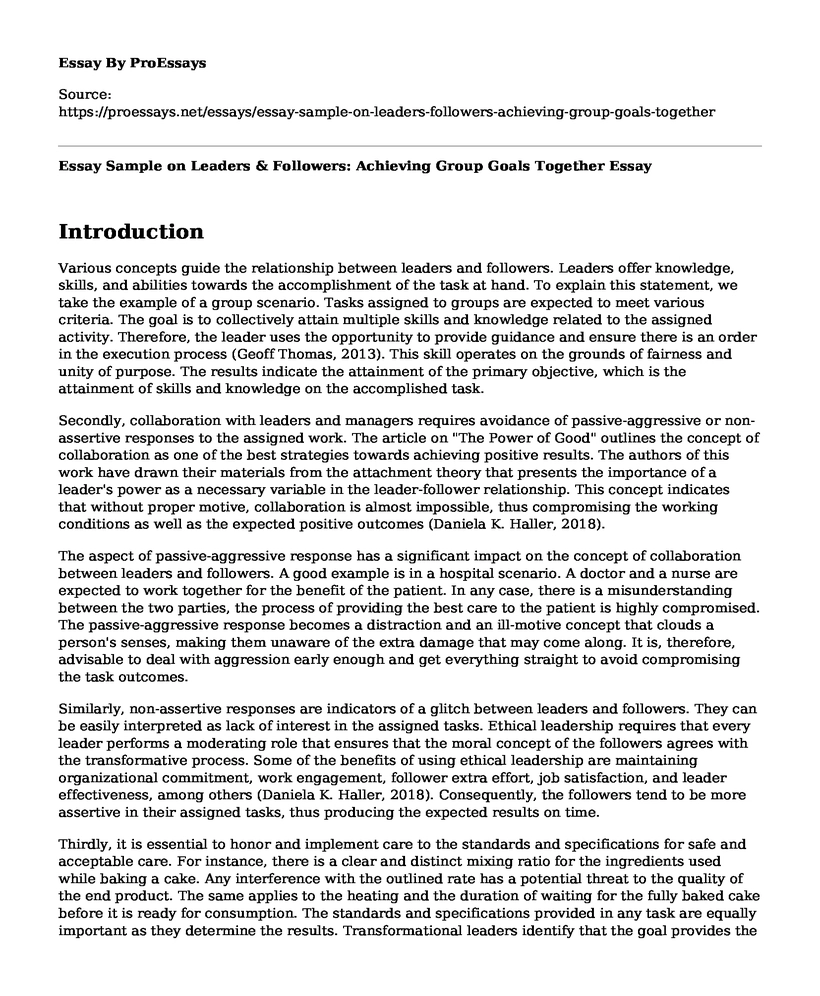Introduction
Various concepts guide the relationship between leaders and followers. Leaders offer knowledge, skills, and abilities towards the accomplishment of the task at hand. To explain this statement, we take the example of a group scenario. Tasks assigned to groups are expected to meet various criteria. The goal is to collectively attain multiple skills and knowledge related to the assigned activity. Therefore, the leader uses the opportunity to provide guidance and ensure there is an order in the execution process (Geoff Thomas, 2013). This skill operates on the grounds of fairness and unity of purpose. The results indicate the attainment of the primary objective, which is the attainment of skills and knowledge on the accomplished task.
Secondly, collaboration with leaders and managers requires avoidance of passive-aggressive or non-assertive responses to the assigned work. The article on "The Power of Good" outlines the concept of collaboration as one of the best strategies towards achieving positive results. The authors of this work have drawn their materials from the attachment theory that presents the importance of a leader's power as a necessary variable in the leader-follower relationship. This concept indicates that without proper motive, collaboration is almost impossible, thus compromising the working conditions as well as the expected positive outcomes (Daniela K. Haller, 2018).
The aspect of passive-aggressive response has a significant impact on the concept of collaboration between leaders and followers. A good example is in a hospital scenario. A doctor and a nurse are expected to work together for the benefit of the patient. In any case, there is a misunderstanding between the two parties, the process of providing the best care to the patient is highly compromised. The passive-aggressive response becomes a distraction and an ill-motive concept that clouds a person's senses, making them unaware of the extra damage that may come along. It is, therefore, advisable to deal with aggression early enough and get everything straight to avoid compromising the task outcomes.
Similarly, non-assertive responses are indicators of a glitch between leaders and followers. They can be easily interpreted as lack of interest in the assigned tasks. Ethical leadership requires that every leader performs a moderating role that ensures that the moral concept of the followers agrees with the transformative process. Some of the benefits of using ethical leadership are maintaining organizational commitment, work engagement, follower extra effort, job satisfaction, and leader effectiveness, among others (Daniela K. Haller, 2018). Consequently, the followers tend to be more assertive in their assigned tasks, thus producing the expected results on time.
Thirdly, it is essential to honor and implement care to the standards and specifications for safe and acceptable care. For instance, there is a clear and distinct mixing ratio for the ingredients used while baking a cake. Any interference with the outlined rate has a potential threat to the quality of the end product. The same applies to the heating and the duration of waiting for the fully baked cake before it is ready for consumption. The standards and specifications provided in any task are equally important as they determine the results. Transformational leaders identify that the goal provides the path through which the followers' attitudes and behaviors should fall to enhance a positive outcome (Barbara Steinmann, 2018).
Concluson
Finally, it is necessary to demonstrate accountability to the team effort. As much as the leader-follower relationship is vital to the mission, liability is an essential tool towards achieving the goal. The primary objective of this concept is that having a goal-oriented performance requires the exceptional influence of the leader and the cultivation owning the outcomes (Starks, 2015). For example, an employee is expected to report any damage relating to the working tools as soon as it happens to avoid compromise to the working-in-progress. Developing trust between the leader and the follower is the primary tool towards accountability.
References
Barbara Steinmann, H. J. (2018). The Path Is the Goal: How Transformational Leaders Enhance Followers' Job Attitudes and Proactive Behavior. Frontiers in Psychology. Retrieved from https://www.ncbi.nlm.nih.gov/pmc/articles/PMC6281759/
Daniela K. Haller, P. F. (2018). The Power of Good: A Leader's Personal Power as a Mediator of the Ethical Leadership-Follower Outcomes Link. Frontiers in Psychology: Organizational Psychology. Retrieved from https://www.frontiersin.org/articles/10.3389/fpsyg.2018.01094/full
Geoff Thomas, R. M. (2013). Leading groups: Leadership as a group process. Group Processes & Intergroup Relations. Retrieved from https://www.researchgate.net/publication/287944323_Leader-follower_relations_Group_dynamics_and_the_role_of_leadership
Starks, F. (2015). Leaders Influence Team Performance and Goal Achievement. About Leaders. Retrieved from https://aboutleaders.com/leaders-influence-team-performance-and-goal-achievement/#gs.u8dazl
Cite this page
Essay Sample on Leaders & Followers: Achieving Group Goals Together. (2023, Mar 27). Retrieved from https://proessays.net/essays/essay-sample-on-leaders-followers-achieving-group-goals-together
If you are the original author of this essay and no longer wish to have it published on the ProEssays website, please click below to request its removal:
- Paper Example on Qatar Airways Strategy
- Tender Application Refusal and Patel Manufacturers Procurement Manager
- Models for Ethical Decision-Making Paper Example
- Christ, Culture, and Career Project Paper Example
- Strategic Management for Mercedes Benz Paper Example
- Essay Example on Creating a Secure and Supportive Group Environment
- Paper Example on Leadership Traits in Correctional Facilities: A Closer Look







